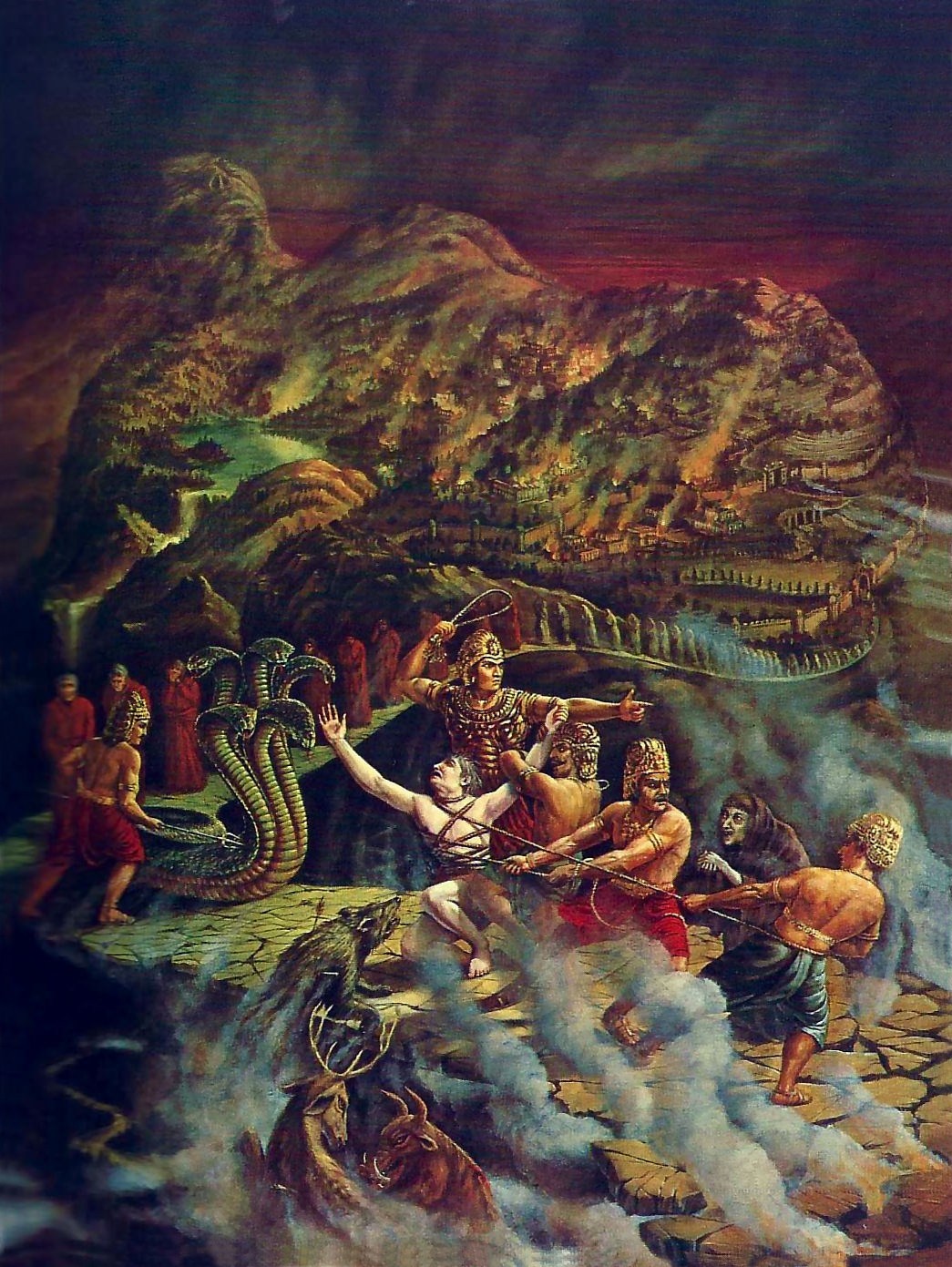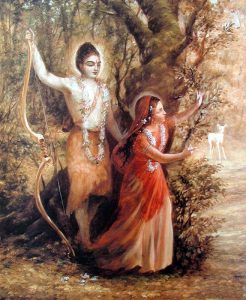
Śrīla Nārāyaṇa Gosvāmī Mahārāja: I had thought that Turkey was a Muslim country, and I was wondering how we would be able to preach there. But when I went there, I saw that there was no discrimination between Hindus, Christians, and Muslims. Just as people in European countries like Indians, so do the Turkish people like Indians. Many devotees came when I was preaching there. It is a very good place for preaching.
(To Śrīpāda Padmanābha Mahārāja) Do you know what bhavāṭavī is?
Śrīpāda Padmanābha Mahārāja: Which?
Śrīpāda Mādhava Mahārāja: It is discussed in the Fifth Canto of Śrīmad-Bhāgavatam.
Śrīpāda Padmanābha Mahārāja: What does ṭavī mean?
Śrīla Nārāyaṇa Gosvāmī Mahārāja: If you do not know this, it means that you have not read Śrīmad-Bhāgavatam at all. What have you been reading? You have been simply reading that “Rādhā is dancing with Kṛṣṇa,” and thinking, “Oh, very sweet!”
We should know what is necessary for us to read and hear at our present stage of development in bhakti.
Śrīpāda Padmanābha Mahārāja: Oh, I remember. It is the forest of material enjoyment. Our Guru Mahārāja, Śrīla Prabhupāda, translated that chapter.
Śrīpāda Nemi Mahārāja: We know all about the forest of material enjoyment. In fact, we have a Ph.D. in material enjoyment.
Śrīla Nārāyaṇa Gosvāmī Mahārāja: Yesterday I spoke about Lord Rāmacandra and told you that Hanumān prayed to Him, “You are the Supreme Lord. It is not possible for you to weep in a fire of separation from Sītā.”
What is the hidden meaning behind this pastime?
Śrīpāda Padmanābha Mahārāja: Lord Rāma came as a king in order to be an ideal example of a perfect human being – a perfect ruler, brother, and husband. He is maryādā-puruṣottama, the Supreme Lord who exemplifies righteousness and proper etiquette.

Śrīla Nārāyaṇa Gosvāmī Mahārāja: Why did He weep when Sītā was stolen? The teaching is that if one is too attached to his wife, he will have to weep.
Lord Rāmacandra is teaching us not to be attached to any lady, and not to marry. One should give this life to Śrī Kṛṣṇa. Why should a person marry? In Bhārata-varṣa, India, so many saints, including both Māyāvādīs and devotees, have taught that the form of a lady is the embodiment of māyā. Even Lord Brahmā, Śaṅkara, and Nārada were cheated by the form of a woman, what to speak of others.
So always be careful of ladies. They want to enter into a man’s life – like a needle (‘in like a needle, out like a plow.’) They tell men, “I have so much affection for you. I will serve you.” And later they become like she-elephants and tigresses.
If I say this among the ladies, they will think that I am criticizing ladies; but this is the fact. Ladies speak very sweetly, and in this way their voices and mood enter a man’s heart. They attract even sannyāsīs.
Śrīpāda Padmanābha Mahārāja: Some of your sannyāsīs do not carry their daṇḍas anymore. They are travelling and preaching, but they do not carry their daṇḍas. Is this correct?
Śrīla Nārāyaṇa Gosvāmī Mahārāja: My Guru Mahārāja and I always carried our daṇḍas. I carried my daṇḍa for over sixty years; I stopped only in the last few years. Now I see that only some of you are carrying your daṇḍas, not all. Giri Mahārāja never takes his daṇḍa with him. Where is Giri Mahārāja? (To Giri Mahārāja) Where is your daṇḍa? Now you have become the paramahaṁsa of paramahaṁsas?
Śrīpāda Giri Mahārāja: My daṇḍa is in Vṛndāvana, Śrīla Gurudeva.
Śrīla Nārāyaṇa Gosvāmī Mahārāja: You are now like me, and Śrīla Bhaktivedānta Svāmī Mahārāja in his last days? You can carry very large bags, but you cannot carry your daṇḍa? You carry not less than forty kilos, so why can’t you carry a daṇḍa? Do you understand? I want you all to carry your daṇḍas, and I am happy if you do. Vana Mahārāja and Tīrtha Mahārāja carry theirs. Mādhava Mahārāja would carry his, but because of me, he is not doing so. He can only take one or the other – me or his daṇḍa. When you become old like me, unable to walk without help, at that time you will not have to carry it.
Walking with a Saint – Morning Walks and Conversations 2008
 Śrīpāda Mādhava Mahārāja: The first line, niṣkiñcanasya bhagavad-bhajanonmukhasya, refers to the understanding that if someone wants to do bhāgavata-bhajana (absorption in the Lord’s devotional service), he must be niṣkiñcana.
Śrīpāda Mādhava Mahārāja: The first line, niṣkiñcanasya bhagavad-bhajanonmukhasya, refers to the understanding that if someone wants to do bhāgavata-bhajana (absorption in the Lord’s devotional service), he must be niṣkiñcana.
The word niṣkiñcana has two meanings. In general it refers to someone who has no worldly wealth, and the spiritual meaning is that Kṛṣṇa is one’s only wealth. We have no wealth other than Kṛṣṇa.
Pāraṁ paraṁ jigamiṣor bhava-sāgarasya means that whoever wants to cross over this material existence, this endless cycle of birth and death, and whoever wants to go to the Lord’s abode and live there permanently, then, what to speak of associating with viṣayīs (sense enjoyers) and yoṣit (the female body, or women engaged in sense enjoyment), even looking at them with greedy eyes, or thinking “I want that,” is tantamount to drinking poison.
Our ācāryas have written in their commentaries to Rāsa-pañcādhyāya that although there are many objects of enjoyment, the greatest object of enjoyment is the female body. Śrīmad-Bhāgavatam tells the allegorical history of King Purañjana, who was so attached to his wife that he took birth as a lady in his next life. If you look at a materialistic lady or any sense enjoyer with greedy eyes, it will be very bad for you. This will spoil your present life as well as many lives after this one. If you take poison you spoil only one life and after that you get another chance to do bhajana. However, hā hanta hanta viṣa-bhakṣaṇato ’py asādhu – if you become entangled with ladies, you suffer a fate more wretched than taking poison.
Śrīla Nārāyaṇa Gosvāmī Mahārāja: This instruction is not only for males. It is for females also.
Śrīpāda Mādhava Mahārāja: For both. Vice-versa.
Śrīla Nārāyaṇa Gosvāmī Mahārāja: It refers to ladies in the case of men, and men in the case of ladies.
Walking with a Saint – Morning Walks and Conversations 2009
Image/Art made possible by Pixabay.com & Krishnapath.org








